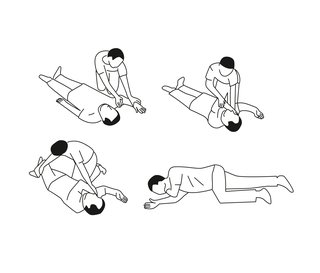Heat exhaustion is not usually serious if you can cool down within 30 minutes. If it turns into heatstroke, it needs to be treated as an emergency.
Anyone can get heatstroke or heat exhaustion. But keep an eye on children, the elderly and people with long-term health conditions like heart problems or diabetes. They're more at risk of heat exhaustion or heat stroke.
Check for signs of heat exhaustion
Signs of heat exhaustion include:
- a headache
- dizziness and confusion
- loss of appetite and feeling sick
- heat rash
- excessive sweating and pale, clammy skin - a change in skin colour can be harder to see on brown and black skin
- cramps in the arms, legs and stomach
- fast breathing or a fast pulse
- a high temperature of 38 degrees Celsius or above
- being very thirsty
The symptoms are often the same in adults and children. But children may become irritable and sleepy.
If someone is showing signs of heat exhaustion, they need to be cooled down and given fluids.
Things you can do to cool someone down
If someone has heat exhaustion:
- Move them to a cool place.
- Remove all unnecessary clothing like a jacket or socks.
- Get them to drink plenty of water or a sports or rehydration drink.
- Cool their skin - spray or sponge them with cool water and fan them. Cold packs around the armpits or neck are good too.
Stay with them until they're better.
They should start to cool down and feel better within 30 minutes.
Emergency action required: Call 112 or 999 or go to your nearest emergency department (ED) if
you or someone else has any signs of heatstroke, such as:
- feeling unwell after 30 minutes of resting in a cool place and drinking plenty of water
- not sweating even while feeling too hot
- a very high temperature of 40 degrees Celsius or above
- fast breathing or shortness of breath
- feeling confused
- a fit (seizure)
- loss of consciousness
- not being responsive
Heatstroke can be very serious if not treated quickly.
Put the person in the recovery position if they lose consciousness while you're waiting for help.
How to put someone into the recovery position
- Kneel by the person and straighten their legs.
- Place the person’s arm closest to you at a right angle to their body, with their elbow bent and their palm facing up - like they are waving.
- Bring their other arm across their chest and place the back of their hand against the cheek closest to you and hold it there.
- Use your free hand to bend the person's knee farthest away from you to a right angle.
- Carefully roll the person onto their side by pulling on the bent knee towards you - keep the back of the person’s hand pressed against their cheek.
- Make sure their bent leg is at a right angle.
- Gently tilt the person’s head back and lift their chin to make sure their airway stays open.

Preventing heat exhaustion and heatstroke
There's a high risk of heat exhaustion or heatstroke during hot weather or exercise.
To help prevent heat exhaustion or heatstroke:
- drink plenty of cold drinks, especially when exercising
- take cool baths or showers
- wear light coloured, loose clothing
- sprinkle water over your skin or clothes
- avoid the sun between 11am and 3pm
- avoid excess alcohol
- avoid extreme exercise
This will also help your body keep itself cool and prevent dehydration.
Content supplied by the NHS and adapted for Ireland by the HSE
